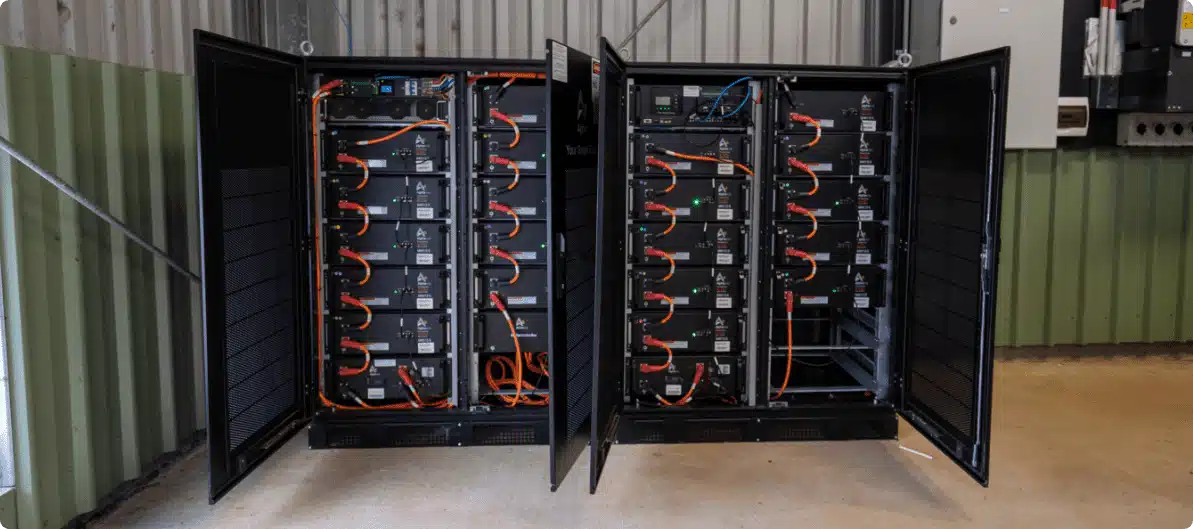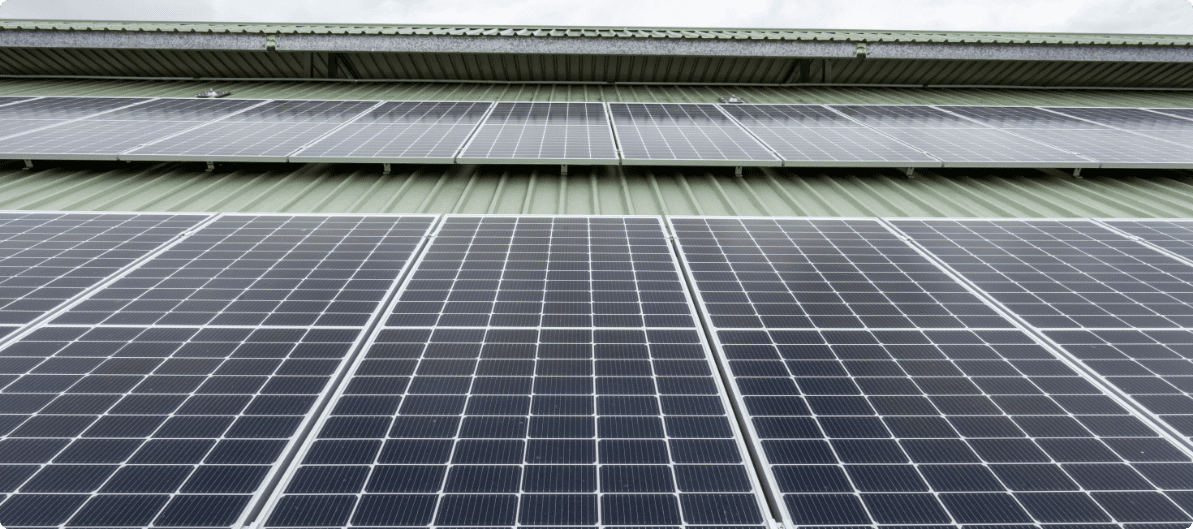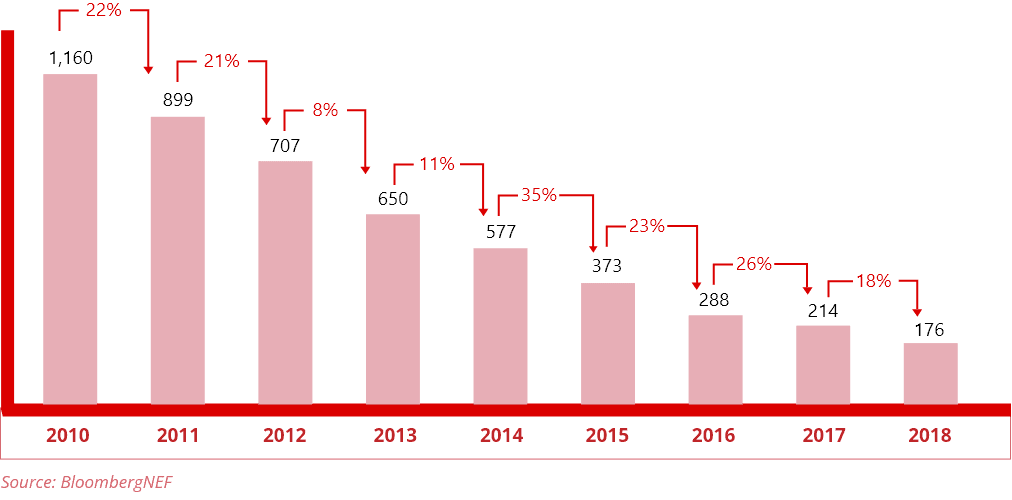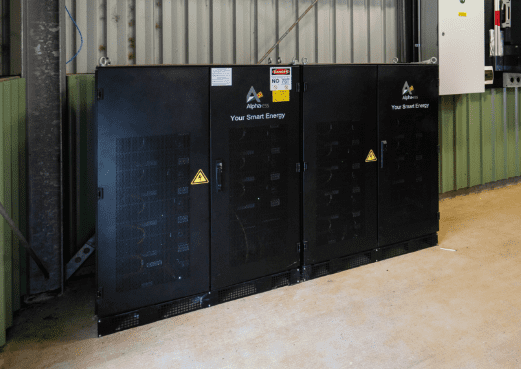BATTERY STORAGE
ENQUIRE NOWEllinbank Solar Battery Storage – Striving toward carbon-neutral farming
Ellinbank Dairy Research Centre is a fully functional dairy farm located in Gippsland, Victoria. It’s wholly run by the Department of Jobs, Precincts and Regions to provide valuable research to the industry and assist in making dairy farming more profitable and sustainable within Victoria. Dairy farming, by its very nature, is environmentally taxing. Not only is the processing of milk an energy-intensive process, but the livestock themselves contribute to greenhouse gases. Ellinbank is dedicated to the ambitious goal of becoming a complete carbon-neutral farm with the help of our solar battery storage system. So far, they have achieved huge steps toward their target with initiatives such as electric farm vehicles.
Ellinbank Dairy Research Center
100kW Solar Battery Installation
Alpha-ESS Commercial
Solar Battery Storage System
A sustainable energy source
Part of the next steps the Research Centre took was to reduce their reliance on electricity from the grid. They went to the market seeking a 99kW renewable energy source combined with a 30kWh solar battery. This power unit was later upsized to 100kWh, making it one of only a small handful in Victoria in that size range.
In recent news, Victoria has announced it will be expanding its renewable energy depository volume to 6.3 GW in the hopes to provide sufficient enough power to homes across half of the state by 2035. The government is planning to give $119 million to a 125MW solar battery inverter that will be placed in Murray Renewable Energy Zone, found in Victoria’s northwest between Bendigo and Redcliffs. They are also in the works to pay out $38.2 million on four different clean energy initiatives, putting $19.3 million into two bioenergy initiatives at farms in Barwon and our client, Ellibank Dairy Research Centre in Gippsland.
KUGA Energy won the tender and set about designing the solution. The solution had to be designed such that it was accessible for educational purposes, and that the battery operated most effectively to complement the farm’s energy usage profile. KUGA Energy supplied a solar battery storage installation to assist in this goal and showcase the technology to other Australian farmers.
Solar battery storage
Originally, the specification for the project included zinc-bromine flow power units. A large part of the spec for this was because these were manufactured in Australia. This technology was ultimately dropped in favour of the lithium-ion solution offered by KUGA (Alpha-ESS).
Despite being a Chinese company, Alpha ESS has committed to building a very large manufacturing facility in South Australia. As such, they are already subsidised by the SA State Government and will rapidly increase their local presence. The final power unit solution installed by KUGA Energy was the Alpha ESS Starion T 30, with 102kWh of usable deposit capacity.

Advanced power unit monitoring
Our commercial solar battery storage system comes with detailed monitoring applications and the ability to configure power unit dispatch requirements for your specific business. The image shows the power unit charge in green, solar PV production in yellow, export in red and grid consumption in blue. This example is typical of a business with a heavy daytime load.
Why solar battery storage?
Solar energy is a fantastic way to draw clean energy directly from the sun. It is often not possible to match the energy requirements of a commercial farm exactly with the peak production from the sun.
Rather than waste the electricity generated by the sun if it is not required, the power gets fed back into the electricity grid, where the owner of the program receives a credit. It is still preferable to use renewable energy if possible because the credit is substantially less than the power costs to buy.
In the case of Ellinbank, it was decided they would prefer to save this valuable clean power and use it at times of peak demand. This reduces electrical costs even further since they get charged based on the maximum electrical draw every month. This is measured in 15-minute intervals. This also reduces the electrical strain on the farm’s electrical supply, lowering the risk of circuit breakers tripping.
KUGAs design team analysed the historical electricity requirements of the farm and programmed a forced discharge of the battery during this time each day. This is a feature known as “load shedding” and further increases the savings produced by a solar battery storage system.

How much does solar battery storage cost?

The biggest obstacle to businesses installing a solar battery storage system is the upfront cost. The good news is that this cost is rapidly reducing. With large and powerful Lithium-Ion power units becoming exceedingly popular in the automotive industry, energy storage was bound to follow suit. According to Bloomberg, Since 2010, the cost of Lithium-ion power units has dropped by 85%. At the same time, global manufacturing of lithium-ion power units has close to tripled since 2014. In dollar terms: basic Lithium-ion power unit pricing has gone from $1,706 per kilowatt-hour in 2010 to $259/kWh in 2018. By 2024, power unit costs could be as low as $147/kWh. For commercial solar battery storage, this pricing for a completely installed three-phase power unit pack translates to the $600/kWh mark. Here is an example to put into perspective: the Tesla Model S has a power unit capacity of 85kWh, and weighs over 500KG. To induct an equivalent capacity grid-connect unit for your business would cost around $50,000.
The Best Solar Battery Storage Solutions

In today’s energy environment, there are a host of experimental and promising battery technologies. In general- there are only four main battery technologies:
• Lithium-ion(Li-ion)
• Nickel Cadmium(Ni-Cd)
• Nickel-Metal Hydride(Ni-MH)
• Lead-Acid
Of these battery sources, Lithium-ion technology is the typically stored energy solution. This is because they provide a variety of benefits for solar battery storage systems including:
• High energy density
• Little or no memory effect
• Good charge retention when not used
• Best performance-to-weight ratio
• Safe for most applications
How Much Can I Save By Performing A Solar Battery Installation On An Already Existing System?
This largely depends on the energy profile. The way energy is used determines whether batteries are worthwhile for your business. Solar battery storage saves money for your business in four major ways:
Capability Statement
Download our Capability Statement to read more on our company, our people, our capabilities and our projects.
DOWNLOAD NOW
Contact Us
Get In Touch, We Love Talking Solar!
Fill out the form below to contact us!













 Get Quote
Get Quote Call Now
Call Now